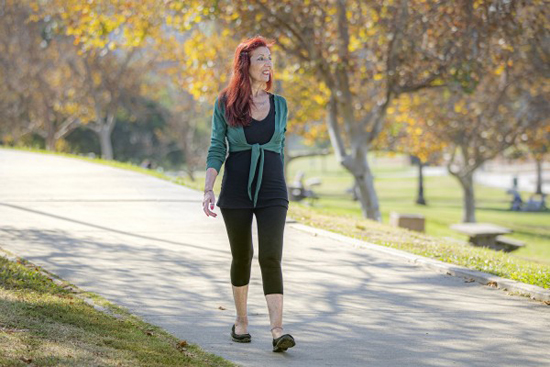Avoiding Social Isolation in Older Adults
Gypsy Hartman walks in the park surrounding the senior center where she's attended Cedars-Sinai exercise classes that aim to help older adults avoid falls and reduce social isolation. Older adults run a high risk of being socially isolated. Social isolation can be easily overlooked as a health concern even though it can have the same negative impact on an older adult's health as smoking 15 cigarettes a day, according to Sonja Rosen, MD, chief of geriatric medicine at Cedars-Sinai. "The medical community and government leaders are increasingly recognizing loneliness as a significant public health issue for older adults," Rosen says. "There are many ways to combat social isolation, especially over the holidays when it's easy to feel alone." Isolation can be a health risk for older adults even if they prefer to live alone, like Gypsy Hartman, 67, who prizes her privacy and freedom. Like many baby boomers, she prefers to keep living at home on her own. After suffering a broken leg last year, Hartman joined exercise classes offered at no cost by the Cedars-Sinai Geriatrics Program and nonprofit partners at local community centers. Supported by a grant from the AARP Foundation, the Leveraging Exercise to Age in Place classes bring older adults together for group workouts that aim to help prevent falls and combat social isolation. Hartman enjoys lifting light weights, stretching, and doing calisthenics in the class held at a senior center near her home. In addition to strengthening her muscles, it's provided an opportunity to connect with others. "It's nice to get out and be around other people. It gives me something to look forward to and a sense of wellbeing," Hartman says. "I really wanted to get stronger, and it feels good to stretch and build up my strength." The classes—light or enhanced strength training and tai chi—have been shown to decrease the risk of falling in clinical research. Cedars-Sinai has been studying the fitness program to determine if the classes also decrease social isolation. Early data suggests they do. "We hope that these classes improve social connectedness among participants and increase their ability to lead independent, vibrant lives," says geriatrician Allison Mays, MD, MAS, who is leading the study. In addition to group fitness, Cedars-Sinai geriatricians suggest the following to fight loneliness: • Volunteer. Nonprofit organizations need help serving meals, caring for animals, or reading with kids. • Tap community resources. Recreation centers, libraries, museums, places of worship, and colleges host free and low-cost community events. • Reconnect with friends and family. Holidays are a good excuse to call loved ones and catch up. • Seek medical advice. A geriatrician can connect older adults with other resources and potential treatments. Read more on the Cedars-Sinai Blog: “Preventing Falls in Older Adults.” Source: Cedars-Sinai |

